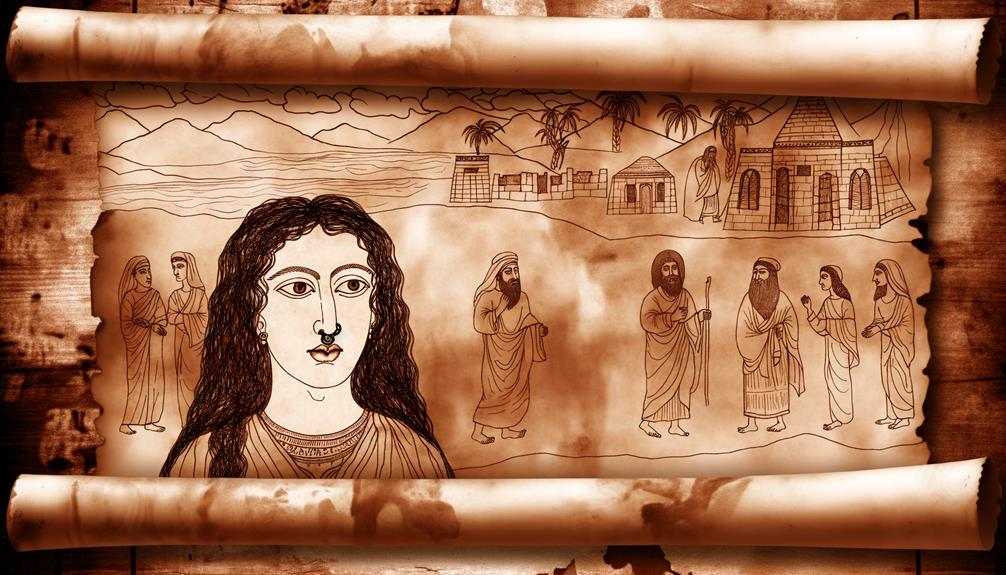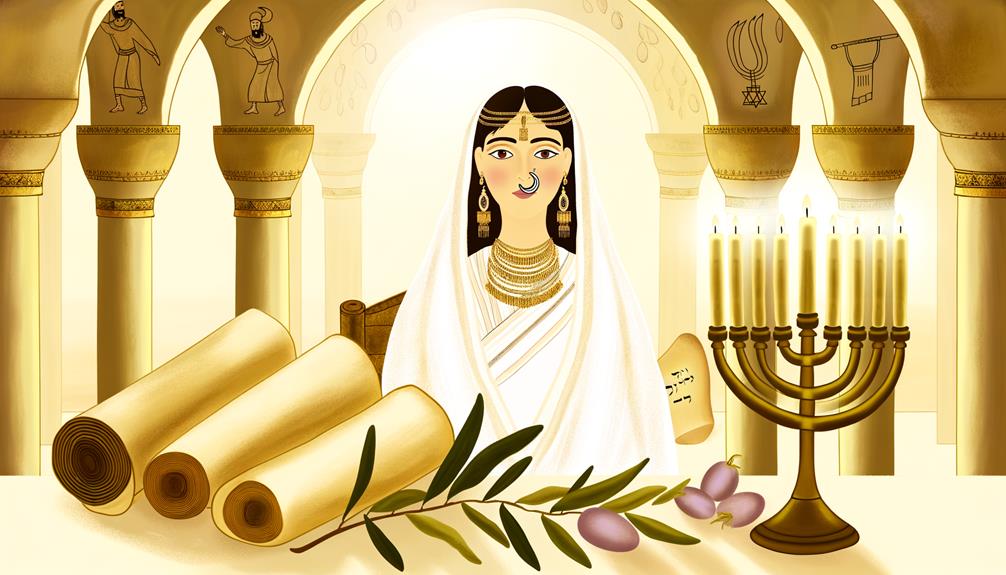Meaning Of Nose Piercing In The Bible: Cultural Context
Nose piercings in the Bible hold significant cultural and theological connotations, deeply embedded in ancient Near Eastern customs. Historically, they served as symbols of social status, marital commitment, and tribal identity.
Scriptural references such as Genesis 24:22 and Ezekiel 16:12 depict nose rings as tokens of matrimonial alliances and divine favor. Theological insight reveals that these adornments were not merely decorative but carried deeper spiritual meanings, including divine blessing and covenant symbolism.
To further understand how these ancient practices were intertwined with faith and societal norms, a closer look at specific biblical narratives and cultural practices is invaluable.

Meaning of Nose Piercing in the Bible: Symbolism, Culture, and Spiritual Significance
| Aspect | Description |
|---|---|
| Definition | Nose piercing involves adorning the nose with a ring or jewel |
| Biblical Reference | Common in ancient cultures; viewed as a gift or sign of beauty |
| Key Scripture | Ezekiel 16:12 – “And I put a ring on your nose…” |
| Symbolism | Beauty, value, blessing, adornment, and covenant |
| Spiritual Insight | Represents God’s care, elevation of status, and covenantal relationship |
Historical Context of Nose Piercing

In the historical context of ancient Near Eastern cultures, nose piercing was a prevalent practice that often held significant social, economic, and symbolic meanings, as evidenced by various scriptural references in the Bible.
Anthropological findings reveal that nose rings were frequently used by women as adornments, signifying marital status or wealth.
In these ancient societies, the act of nose piercing was more than mere decoration; it signified a rite of passage and social distinction.
The Hebrew Scriptures, among other ancient texts, suggest that such bodily ornamentation was associated with family honor and tribal identity.
The theological implications of these practices offer insights into the values and norms of early biblical communities, reflecting their complex socio-religious frameworks.
Biblical References to Nose Piercing

Numerous passages within the Bible, particularly in the Old Covenant, mention nose piercings, often highlighting their cultural and symbolic significance in ancient Hebrew society.
For instance, Genesis 24:22 recounts Abraham’s servant presenting Rebekah with a gold nose ring as a sign of betrothal, indicating its role in matrimonial customs.
Additionally, Ezekiel 16:12 portrays God adorning Jerusalem, symbolized as a woman, with a nose ring, suggesting divine favor and beauty.
These references underscore the theological insights where nose piercings were seen as markers of identity, status, and divine blessing.
Cultural Significance in Ancient Times

In ancient Near Eastern cultures, nose piercings were often imbued with profound social and theological significance.
Scriptural passages such as Genesis 24:22 and Ezekiel 16:12 highlight their roles as symbols of marriage and indicators of wealth and status.
Additionally, these adornments occasionally served religious purposes, reflecting deeper spiritual meanings within the communities.
Symbol of Marriage
Nose piercings in ancient biblical times were often emblematic of marital status, as evidenced by the practice of gifting a nose ring to Rebekah in Genesis 24:22, symbolizing her betrothal to Isaac.
This tradition reflects a broader cultural norm wherein jewelry, including nose rings, served as tokens of commitment and union. The act of presenting a nose ring was not merely ornamental but carried significant theological implications, denoting God’s providence and blessing upon a marriage.
In this situation, the nose ring was a physical manifestation of an agreement, underscoring the sacred covenant between individuals. Thus, the biblical narrative frames nose piercings as profound symbols of matrimonial alliance, intertwined with divine favor and covenantal fidelity.
Wealth and Status
Throughout ancient biblical times, nose piercings served as markers of wealth and social status, illustrating the wearer’s affluence and esteemed position within the community.
Scriptural accounts and historical texts provide context to this practice:
- Genesis 24:22 – Abraham’s servant gifted Rebekah a gold nose ring, symbolizing her worth and alliance with a prosperous family.
- Proverbs 11:22 – A gold ring in a swine’s snout is likened to a beautiful woman without discretion, implying valuable adornment.
- Isaiah 3:21 – The prophet Isaiah lists nose rings among the luxurious items owned by the daughters of Zion.
- Historical Evidence – Archaeological findings reveal nose rings made of precious metals, underscoring their role as symbols of economic status.
These references highlight how nose piercings signified opulence and societal ranking in biblical times.
Religious Practices
Delving into the cultural and religious significance, nose piercings in ancient biblical times often served as ritualistic symbols, reflecting deeper spiritual meanings and covenantal relationships.
Scriptural references, such as Genesis 24:22, where Abraham’s servant gifts Rebekah with a gold nose ring, highlight their role in matrimonial customs and divine promises.
Theologically, such adornments were not mere ornaments but signifiers of divine favor and human commitments. In Ezekiel 16:12, God adorns Jerusalem with a nose ring, symbolizing His covenant and adornment of His chosen people.
Consequently, nose piercings transcended mere decoration, embodying sacred and community bonds, as well as the intertwining of the divine and the human in a covenantal narrative.
Symbolism in Jewish Tradition

In Jewish tradition, nose piercing holds historical significance that can be traced back to biblical times, as evidenced in Genesis 24:22 where Abraham’s servant gifts Rebekah a nose ring.
This practice is embedded in cultural rites and beliefs, symbolizing wealth, beauty, and social status.
The theological implications are enriched by scriptural references, indicating the acceptance and reverence of bodily adornments within the covenant community.
Historical Significance of Piercing
Piercing in Jewish tradition, as evidenced by various scriptural references, carries profound symbolic significance related to identity, covenant, and social status. Historically, piercings are mentioned in biblical texts, reflecting cultural norms and religious practices. For instance, in Genesis 24:22, Abraham’s servant presents Rebekah with a nose ring, symbolizing her forthcoming marriage covenant.
- Identity and Status: Piercings often denoted social rank or tribal affiliation.
- Covenant Symbolism: Jewelry, including nose rings, could signify divine or matrimonial covenants.
- Servitude and Freedom: In Exodus 21:6, ear piercing marked a servant’s voluntary lifelong service.
- Adornment and Beauty: Ezekiel 16:12 highlights piercings as ornaments enhancing beauty, symbolizing divine favor.
These practices underscore the multifaceted significance of piercings within Jewish tradition.
Cultural Practices and Beliefs
The symbolic significance of piercings in Jewish tradition extends beyond mere adornment, representing profound theological and social dimensions documented in scriptural narratives.
In Genesis 24:22, Abraham’s servant gifts Rebekah a nose ring, signifying her selection and covenantal bond in marriage. This act underscores the cultural importance of jewelry as marks of identity and fidelity.
Ezekiel 16:12 further illustrates this, where God adorns Jerusalem with jewelry, including a nose ring, symbolizing divine favor and covenant.
Theologically, these references highlight a deeper spiritual connection, where physical piercings mirror relational and divine commitments.
Consequently, nose piercings in Jewish tradition transcend ornamentation, encapsulating intricate layers of covenant, identity, and divine association within their cultural and historical milieu.
Spiritual Meanings and Interpretations

Exploring the spiritual meanings and interpretations of nose piercings within the biblical context reveals a rich tapestry of cultural and religious significance.
In the Bible, nose piercings can symbolize:
- Covenant and Commitment: In Genesis 24:22, Abraham’s servant gifts Rebekah a nose ring as a sign of betrothal.
- Adornment and Beauty: Ezekiel 16:12 describes God adorning Jerusalem with jewelry, including a nose ring, to symbolize beauty and favor.
- Identification and Status: Historically, nose rings indicated social status or tribal affiliation, as seen in various ancient cultures.
- Divine Favor: The use of nose rings in biblical narratives often signifies God’s blessing or approval upon individuals, reflecting deeper theological insights.
These interpretations provide a nuanced understanding of nose piercings in biblical texts.
Gender Roles and Nose Piercing

Understanding the spiritual and cultural meanings of nose piercings in biblical writings paves the way to examine how these adornments intersect with gender roles in ancient societies.
In the Old Covenant, nose piercings were often associated with women, as seen in Genesis 24:22, where Abraham’s servant gifts Rebekah a nose ring. This practice underscores the adornment’s role in female identity and social status.
Women adorned with nose rings were often perceived as part of a divine agreement, reflecting their roles within familial and societal structures. Theologically, such adornments symbolized beauty and honor, aligning with the broader biblical narrative that celebrated feminine grace and virtue.
Consequently, nose piercings were not merely decorative but integral to gender-specific religious and cultural expressions.
Nose Piercing in Marriage Customs

Historically, the practice of gifting nose rings during betrothal ceremonies, as mentioned in Genesis 24:47, shaped marital customs and religious symbolism in biblical times.
In Genesis 24:47, Abraham’s servant gives Rebekah a nose ring, signifying her betrothal to Isaac. This act encapsulates several key elements:
- Ownership and Commitment: The nose ring symbolized a binding agreement, signaling the woman’s exclusive commitment.
- Value and Wealth: The nose ring, often made of precious metals, represented the groom’s wealth and status.
- Cultural Identity: The practice reinforced cultural norms and social structures within the community.
- Spiritual Significance: It underscored divine involvement in marital unions, as seen in the providential guidance in Rebekah’s selection.
These elements reflect a rich interplay of cultural and theological dimensions.
Modern Views on Biblical Nose Piercing

In contemporary discourse, the practice of nose piercing as depicted in the Bible invites a nuanced exploration of its cultural, theological, and historical implications.
Historically, nose piercing is referenced in Genesis 24:22, where Abraham’s servant gifts Rebekah a nose ring, symbolizing wealth and marital arrangements. Modern interpretations vary; some view it as a continuation of ancient traditions, while others see it as merely aesthetic.
Theologically, it prompts discussions on bodily adornment and personal expression within Christian communities. For many, it remains an emblem of cultural identity rather than a religious mandate.
Consequently, understanding nose piercing through a biblical lens requires a balanced appreciation of its historical context and evolving significance in contemporary belief systems.
Conclusion
To summarize, nose piercing, as explored through historical context, scriptural references, and theological insight, holds multifaceted meanings within the biblical narrative.
It symbolizes various aspects of cultural, spiritual, and social life in ancient times, from marital customs to expressions of identity.
The practice, deeply rooted in tradition, serves as a window into understanding ancient societal norms and spiritual beliefs.
As the saying goes, ‘old habits die hard,’ underscoring the enduring relevance and complexity of this ancient practice.






